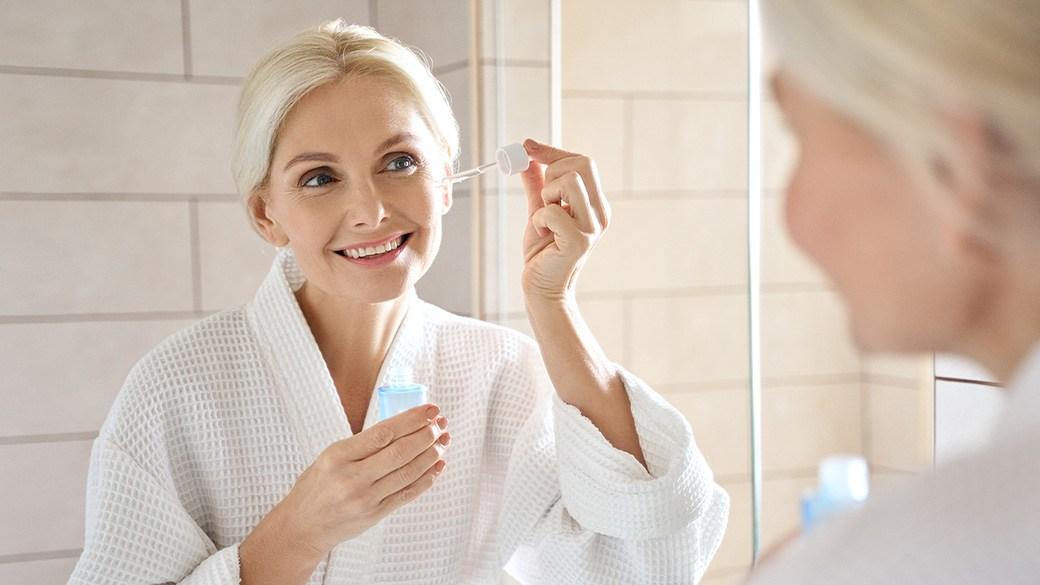Which eye serums are best?
The skin around the eyes is extremely thin and delicate, which is why it’s usually the first area of the face to show signs of aging or give away the fact that you didn’t get a good night’s sleep. Fortunately, whether you’re plagued by fine lines, dark circles, puffiness or wrinkles, a high-quality eye serum can help give your eye area a more youthful, rested appearance.
Some eye serums are better suited for certain skin issues than others, though, so it’s essential to find a formula with the right ingredients. The top serum from Clinique is such a popular formula because it’s suitable for all skin types and can improve the signs of aging in just a few weeks.
What to know before you buy an eye serum
Eye serum benefits
Before you buy an eye serum, it’s important to understand the results you can expect.
Moisturizes: It’s easy for your under-eye area to become dry and dehydrated because the skin in that area is so thin. An eye serum can hydrate under your eyes and attract additional moisture to keep the skin smooth, supple and hydrated.
Reduces dark circles: Dark circles can appear under your eyes due to a lack of sleep, stress or genetics. An eye serum can reduce darkness under the eyes, brighten the skin and make it less transparent.
Reduces puffiness: Whether due to poor sleep, allergies, fluid retention or other factors, it’s common to experience under-eye bags or puffiness. An eye serum can help tighten the skin and make the under-eye area less puffy.
Reduces fine lines and wrinkles: Eye serums often feature ingredients that help smooth fine lines and wrinkles under the eyes by encouraging skin cell turnover. That helps improve the texture to help your eyes look younger.
Improves firmness and elasticity: It’s not uncommon for the skin under your eyes to start sagging as you age. An eye serum can stimulate collagen production to help make the skin firmer and more elastic.
Eye serum vs. eye cream
In some ways, eye serum and eye cream are very similar. However, some key differences may make a serum a better choice for your skincare routine.
An eye serum typically has a thinner, lighter consistency than an eye cream. That makes it an excellent option for oily skin. It’s also a better option if you’re prone to milia, which are small bumps that occur beneath the skin when heavy, rich products block your oil glands.
The lightweight texture of an eye serum also means that it’s absorbed more easily than an eye cream. As a result, you don’t have to pull and tug at your under-eye area as much to rub it in, which can help prevent fine lines and wrinkles.
Eye creams are more likely to leave a residue behind, too, since they’re thicker and richer. On the other hand, an eye serum soaks into the skin right away, so you can apply makeup over it without any issues.
Eye serum active ingredients
The key to choosing the right eye serum is knowing the most effective active ingredients for the issue you wish to address.
For dryness, look for:
Hyaluronic acid, which aids the skin in absorbing and retaining moisture.
Ceramides, which help prevent moisture loss.
For fine lines and wrinkles, look for:
Retinol, which helps encourage cell turnover and collagen production.
Peptides, which can help promote collagen production.
Vitamin C, which stimulates collagen production and prevents free radical damage.
For dark circles, look for:
Vitamin K, which can reduce blood flow in the capillaries under the eyes to keep it from pooling and causing darkness.
Vitamin C, which helps brighten and minimize discoloration in the skin.
Kojic acid, which reduces melanin production to decrease darkness.
Caffeine, which encourages the blood vessels to constrict and reduce darkness.
Retinol, which helps promote collagen production to thicken the skin.
For puffiness, look for:
Caffeine, which helps constrict blood vessels to tighten the skin.
Green tea extract, which is an anti-inflammatory that can help reduce swelling under the eyes.
Retinol, which stimulates collagen production to reduce swelling.
For sagging skin, look for:
Retinol, which encourages collagen production to boost elasticity for a firmer appearance.
Peptides, which help tighten and firm the skin.
What to look for in a quality eye serum
Eye serum consistency
As a rule, eye serums are thinner and lighter than eye cream. However, there’s some variation among serums when it comes to consistency.
You can find some serums with a watery consistency, so they soak into the skin quickly and easily. These are the best options for oily or milia-prone skin.
Other eye serums are thicker, so they fall somewhere between a liquid and a gel. These formulas are usually more hydrating, so they work well for dry skin.
Eye serum fragrance
Many eye serums are scented to give them a more pleasant fragrance when you’re applying them. If you have sensitive eyes or skin, however, artificial fragrances can be highly irritating. Instead, opt for a fragrance-free formula.
Product size
Most eye serums come in a container that holds 0.5 fluid ounces. You can find some larger serums that provide up to a full fluid ounce, though.
It’s essential to keep the size of the serum in mind when considering its price. A larger container will cost more, but it may also be a better value per ounce.
Eye serum packaging
You’ll usually find eye serums in a plastic or glass bottle. Many have a medicine dropper dispenser built into the cap to provide the right amount of the thin serum each time. This type of packaging works well, but it can get messy if the bottle is knocked over.
Other serums come in a bottle with a pump dispenser to avoid a mess. You don’t have the same control over the amount of product that’s dispensed as you do with a medicine dropper, though, so you can wind up wasting some of the serum.
How much you can expect to spend on an eye serum
Drugstore formulas that use lower-quality ingredients generally cost between $10-$30, while serums with average- to high-quality ingredients typically range from $30-$75. Eye serums from luxury brands can cost as much as $250.
Eye serum FAQ
How often should I apply an eye serum?
A. For the best results, you should use an eye serum twice daily: in the morning and at night. A serum should be the first step in your skincare routine because it absorbs so easily into the skin.
Can I use an eye serum with an eye cream?
A. While eye serums and eye creams serve many of the same purposes, you can layer them if you want. For more intense hydration, it often helps to apply an eye cream over a serum if your under-eye area is particularly dry.
What’s the best eye serum to buy?
Top eye serum
What you need to know: This versatile serum provides quick results.
What you’ll love: It’s made by a trusted name in the skincare field. It’s suitable for all skin types and offers superior hydration. The formula is fragrance-free. It can reduce the appearance of fine lines and age spots in just two weeks.
What you should consider: It can sting if it gets in your eyes.
Top eye serum for the money
What you need to know: It’s a serum that’s specifically formulated to fight puffiness, redness and other under-eye problems.
What you’ll love: It can reduce puffiness and redness instantly. It makes eyes look brighter and more awake.
What you should consider: It doesn’t work well for oily skin. It can leave behind a greasy residue.
Worth checking out
Perricone MD Vitamin C Ester Eye Serum
What you need to know: This brightening, illuminating serum helps smooth wrinkles, too.
What you’ll love: This serum works for all skin types. It features antioxidants to fight free radical damage. It brightens dark circles and prevents moisture loss. It also firms the skin.
What you should consider: It has a somewhat sticky texture, so it’s difficult to layer under other products.
Prices listed reflect time and date of publication and are subject to change.
Check out our Daily Deals for the best products at the best prices and sign up here to receive the BestReviews weekly newsletter full of shopping inspo and sales.
BestReviews spends thousands of hours researching, analyzing and testing products to recommend the best picks for most consumers. BestReviews and its newspaper partners may earn a commission if you purchase a product through one of our links.












